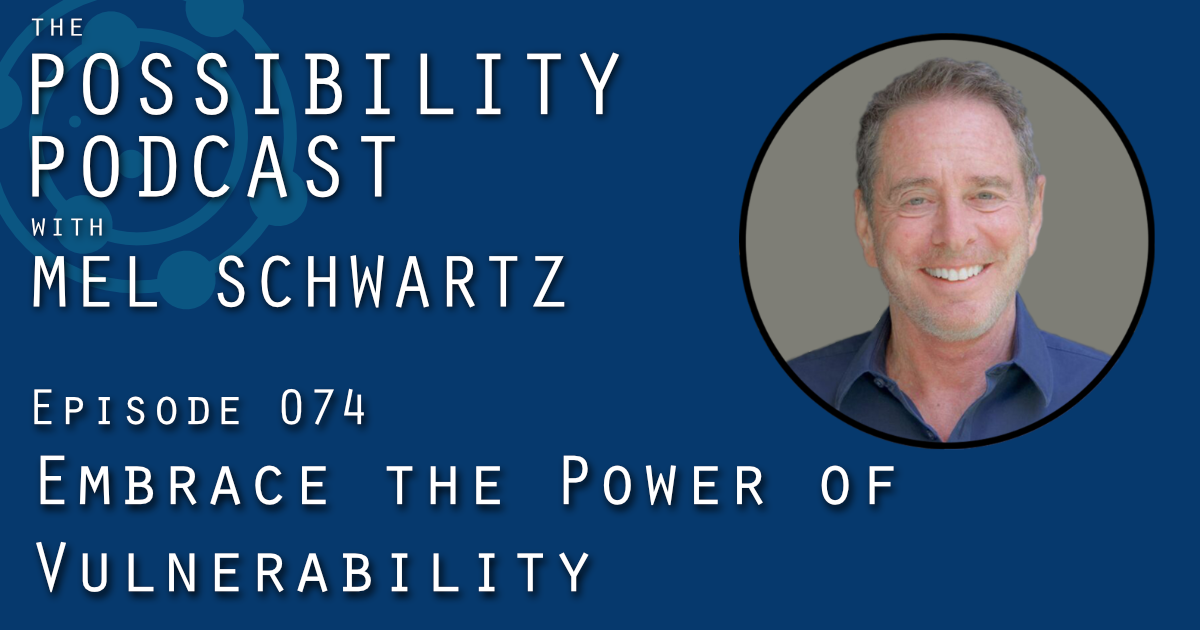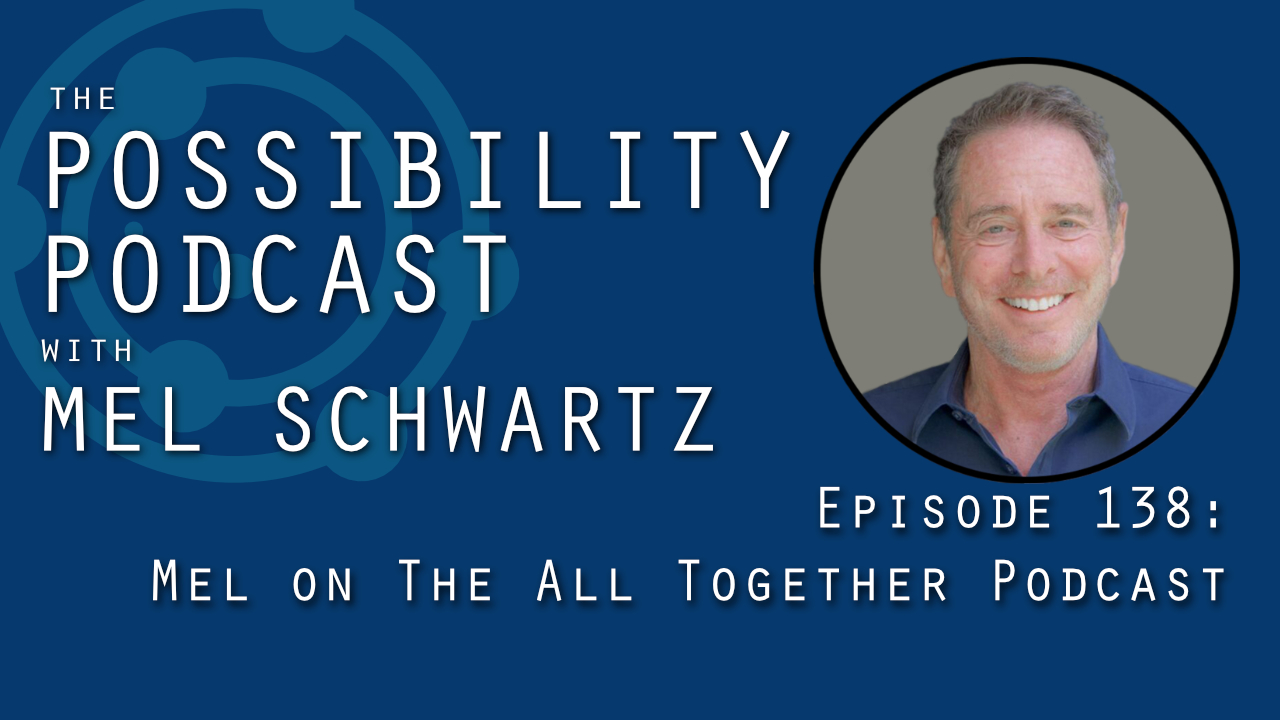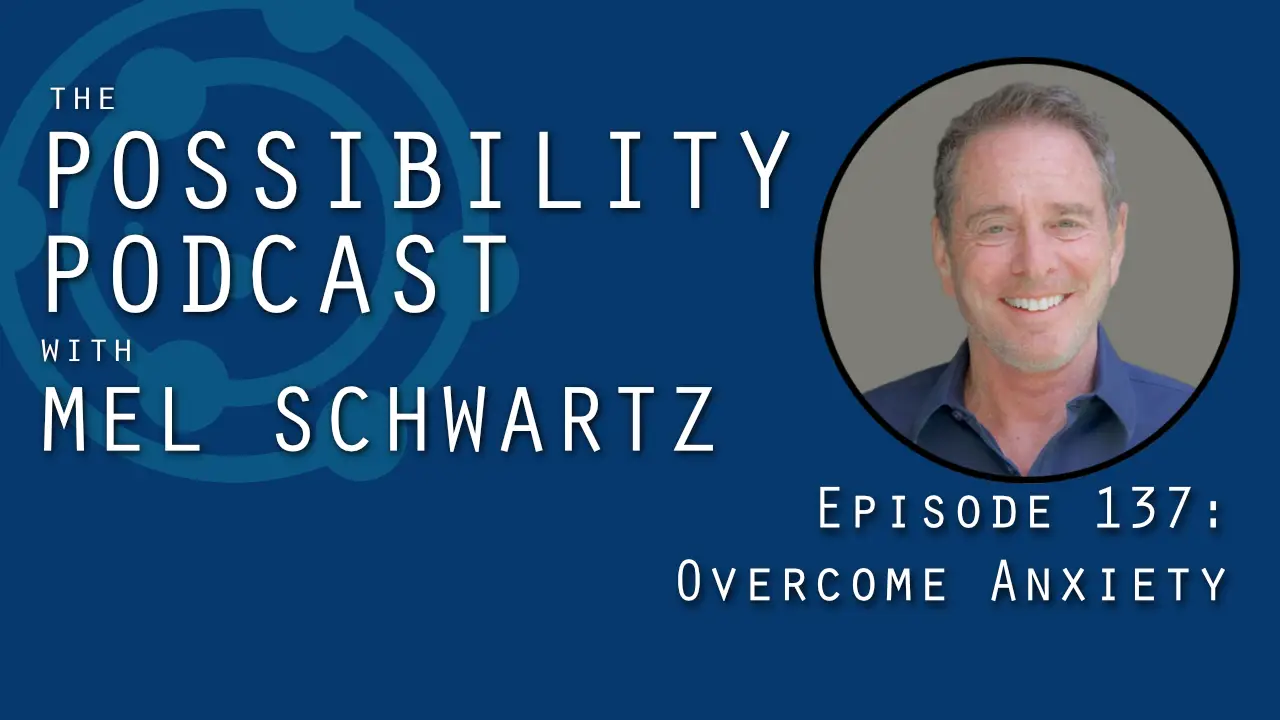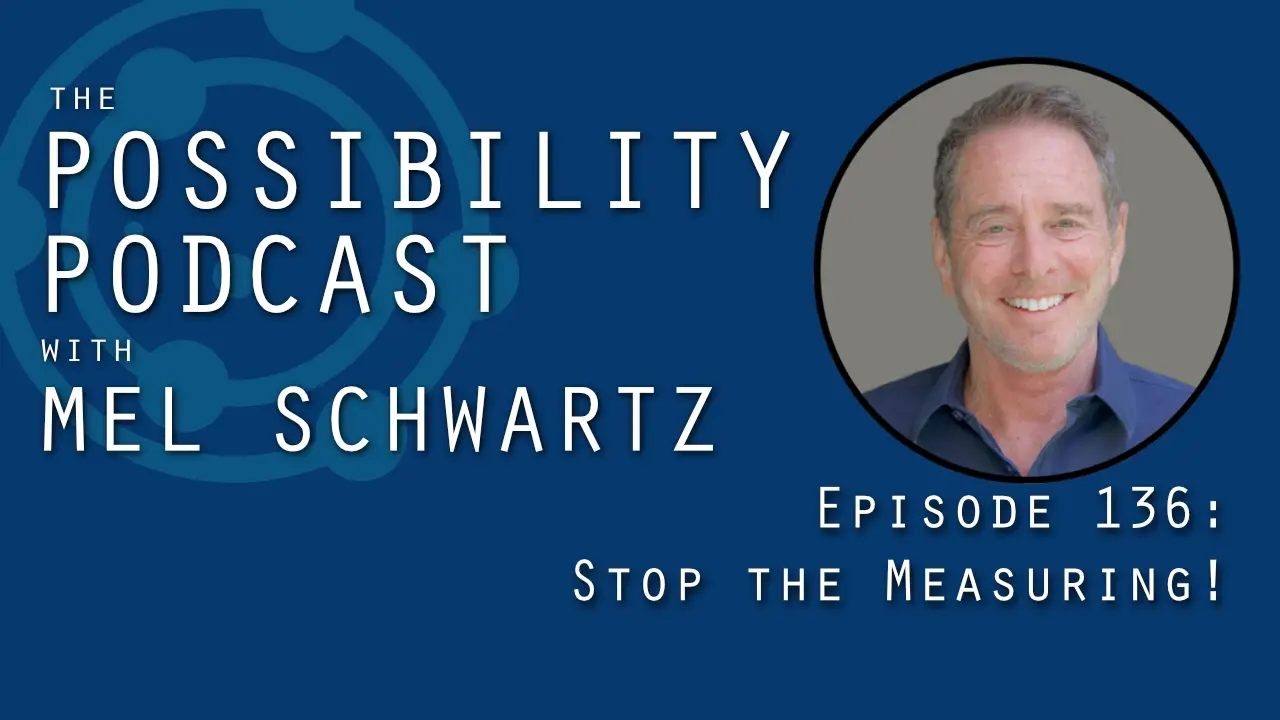Podcast: Play in new window | Download
In this episode of the Possibility Podcast with Mel Schwartz, we examine the paradoxical power of vulnerability. Listen along to learn…
- the true meaning of vulnerability
- why acting strong is truly being weak
- how we’ve been wrongly taught to reject vulnerability
- how vulnerability strengthens your self-worth
Are you ready to embrace the power of vulnerability in your life and harness one of the most powerful tools to achieve self-worth?
Interested in bespoke marriage and relationship counseling from Mel Schwartz? Reach out!
How has your embrace of vulnerability changed your life for the better? Be sure to share your experience in the comments!
Transcript of The Possibility Podcast with Mel Schwartz #074
Hello everybody and welcome to the Possibility Podcast. I’m your host, Mel Schwartz. I practice psychotherapy, marriage counseling, and I am the author of the book The Possibility Principle, the companion to this podcast. I hope to be your thought provocateur, and I’ll be introducing you to new ways of thinking, and a new game plan for life.
Hello everybody, and welcome to today’s episode of the Possibility Podcast.
Very often, I refer to how words, when we really examine them, don’t mean what we think they mean. They require greater scrutiny. Today we’re going to look at the word “vulnerable” or “vulnerability,” and more deeply, we’re going to take a look at the underlying philosophy around vulnerability and weakness in our culture, and the unintended consequences of the impact about hiding our vulnerability, and how it actually decimates our self-esteem.
So, let’s begin with the word “vulnerable.” The dictionary reads, “Vulnerable: Open to attack, criticize, or a temptation.” Well, if you’re not open to attack, criticism, or temptation, I would think that you’re living in a cave; you’re isolated. Anyone is open to criticism, whether their criticism of their own self, or criticism from others. Judgment from others.
Second definition of vulnerability: willing to show emotion, to allow one’s weakness to be seen or known.
That’s consistent, Now, in western culture, particularly in American culture, there’s a message we receive: don’t be vulnerable. Don’t show your weakness or your insecurity. Hide it; pretend to be strong.
Acting strong is acting. Pretending to be strong is actually weak, because you’re hiding your weakness from others. Now: why would we want to do that?
Well, we’ve been trained to do it by our culture. Our families. You know, be careful what you say, think before you speak. So many people I’ve worked with have talked about, in their childhoods, a message from one or both parents was to have apprehension or fear about how others saw you. Now, I’m going to propose, paradoxically today, that vulnerability is not weak. It’s not fragile. It’s actually the opposite. If I hide my thoughts feelings my insecurities and doubts because I’m afraid of what you or others may think of me, that’s actually weak. I’m betraying my own self-worth, my own authenticity, out of my concern for what you may think of me. Does that sound strong? Or does that sound frightened?
Hiding your vulnerability is weak. Paradoxically, sharing your self-doubt or your insecurity is powerful. It does two things. It means that you’re not judging yourself. So if you don’t judge yourself, you’re not granting someone else the power or the opportunity to be your judge. Acting strong is acting; it’s faking it. So the goal is, don’t succumb to weakness by hiding it and imprisoning it. When you share your self-doubt, your insecurity or your weakness. It’s no longer buried within you, or imprisoned. It begins to lose its grip on you. If you go through life fearfully hiding it from others, it’s your constant companion. Wouldn’t you like to release that insecurity and that self-doubt? I can’t tell you how many times in my own life, or in my working with others, when they have shared or I have shared how by sharing an insecurity felt like a release I have nothing to hide.
Many of you may have heard me speak before about another paradox: self-esteem versus what I call other esteem. As a culture, we derive our self worth, too often, not from self, but from what kind of approval and recognition and praise we can elicit from other people. That is not self-esteem. That is what I call other esteem. When you hide your insecurity, you’re seeking other esteem. You’re setting others up as your judge.
Think of yourself on the seesaw. You’re in a down position. You’ve now elevated the other person to the up position. Is that any way to go through life? Betraying yourself. And by the way when you hide that self-doubt and that insecurity, it becomes shame. You carry this burden of shame without you throughout your life: “I’m not good enough. I’m not smart enough. I’m not attractive enough. I’m not likeable enough.” You bury it. It has nowhere to go. It’s stuck inside the container of your own fear.
Again, once you share those insecurities with others, you’re no longer allowing them to be your judge. You see, the fear of others judging you is a projection of the fact that you’re judging yourself. You’re taking your judgment of yourself, and you are then projecting it onto others. And by the way, these other people, they’re no different than you. The silliness, the stupidity that we’re hiding from each other because we’re afraid of what each of us is going to think of the other — that is just and absolutely nuts way of going through life, isn’t it?
So rather than worrying about how you think other people will see you, more importantly, how do you choose to see yourself. That’s the most important relationship in your life. It’s with your own self. Why are you subordinating your sense of self and elevating the opinions of other people?
Now: when you embrace your vulnerability, you’re treating yourself with self-worth. You’re a human being. We all have insecurities and doubts and when you do that you release the shame. You can watch it evaporate. So think to yourself very simply: my insecurity; my fears. Do I want to hide them, or do I choose to share them? That is the paradox of vulnerability.
Vulnerability is simply being human. It’s not weak. The weakness is hiding it shamefully. Sharing it is strong. Think about a powerful hurricane and think about a strong, rigid, formidable oak tree, or, a willow tree. The flexibility of the willow tree will survive the winds. The oak tree may very well crack.
Now: if you can validate yourself — and validating yourself means simply affirming what you feel, it doesn’t mean I’m good I’m great I’m exceptional — validating myself may sound like, “I have an insecurity; let me share it with you.” That is a self- validation. When you self Valididate, you remove the opportunity for other people to be judgmental of you.
They may still have an opinion. But why do you elevate someone’s opinion to a judgment? Remember as I’ve said many times they’re just people, they are not judges in the courthouse rendering a verdict. Just people with opinions. So often people say “I’m afraid of people’s judgment.” That’s the judging of self. Don’t elevate an opinion to a judgment, and realize that they’re likely doing the very same thing you are.
So the new philosophy for living here that I’m speaking about is come out from hiding, share your authentic self, lean into your insecurities, and you will grow by leaps and bounds.
To hear more deeply on this theme around self-esteem or other esteem, listen to my podcast called “Developing Authentic Self-Esteem,” in which I interview a young man who had worked with me in therapy and he is so kind and generous as to share his experiences, what he learned in the process, and how he came to develop really powerful, authentic self worth.
Arguably one of the most important things in your life is to develop genuine self worth. You can only do that by embracing vulnerability. Remember, vulnerable means “open to attack or criticism.” Well if you’re a human being you are open to attack or criticism. We all have insecurities of different shapes and forms. The way to process and work through those insecurities is to share them, release them, and they will tend to evaporate. Try it on, see how it goes, and please let me know.
Until next time, be well, embrace your vulnerability, and soar in your self-worth. Bye for now!
I hope you enjoyed this episode of the Possibility Podcast. I welcome your feedback on this and any episode. Please send me an email at mel@melschwartz.com or leave a comment in the show notes for this episode at melschwartz.com. If you like what you’re hearing, please take a moment to rate and review the show at Apple Podcasts, Spotify, or wherever you get your podcasts. Your reviews really help boost the visibily for the show, and it’s a great way for your to show your support.
Finally, please make sure to subscribe to the Possibility Podcast wherever you listen to podcasts, and that way you’ll never miss an episode. Thanks again, and please remember to always welcome uncertainty into your life and embrace new possibilities.
Subscribe to The Possibility Podcast with Mel Schwartz
Don’t miss a single Possibility Podcast with Mel Schwartz! Subscribe for free in iTunes / Apple Podcasts, YouTube, Spotify, RadioPublic, Spreaker, or wherever you listen to podcasts. Or, simply copy / paste the RSS link directly into the podcast app of your choice!
Please Rate and Review
If you enjoy The Possibility Podcast with Mel Schwartz, please take a moment to rate and review the show in iTunes / Apple Podcasts or Podchaser. It only takes a few minutes, and adding your review is as easy as clicking this link.
Your rating and review helps raise the visibility of The Possibility Podcast with Mel Schwartz, especially on iTunes / Apple Podcasts, which is one of the biggest podcasting platforms today. More visibility for the show means more listeners… and that growth means the show reaches — and helps — more people like you.
Thank you!
Talk With Mel!
Help others when Mel helps you: Contact Mel and find out how you can be a caller on the show and ask Mel a question. He’ll put the Possibility Principle to work for you, and your conversation will be recorded for use in a future episode of the podcast so other listeners can benefit.




